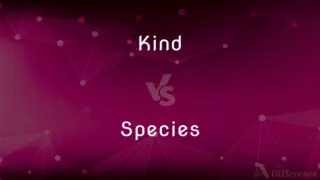Adjective vs. Predicate — What's the Difference?
By Tayyaba Rehman — Updated on September 27, 2023
An adjective describes or modifies a noun. A predicate tells what the subject does or is. While an adjective characterizes, a predicate asserts.

Difference Between Adjective and Predicate
Table of Contents
ADVERTISEMENT
Key Differences
In the realm of grammar, both the adjective and the predicate have vital roles. The adjective, as many might know, serves the purpose of describing or modifying a noun or pronoun. It gives us more information about the noun's size, shape, age, color, or material. On the other side, the predicate, an essential component of every complete sentence, provides information about what the subject does or what it is.
Consider the sentence: "The red ball bounces." "Red" here is the adjective because it describes the noun "ball". However, "bounces" is the predicate, as it tells us what the ball (the subject) does. In this scenario, both the adjective and predicate work together to provide a complete thought.
It's crucial to understand that while every sentence must have a predicate to be considered complete, not every sentence needs an adjective. Adjectives enhance descriptions, but predicates are foundational to statements. If you say, "Birds fly," "fly" is the predicate. But if you add "colorful birds fly," "colorful" is the adjective enriching the description.
Adjectives can sometimes be found within predicates. For example, in the statement, "The cat is fluffy," "fluffy" is an adjective describing the cat, but "is fluffy" as a whole functions as the predicate, providing information about the subject.
In essence, while adjectives add flair and detail to nouns, predicates are essential for a sentence to convey a full thought or action about the subject.
ADVERTISEMENT
Comparison Chart
Function
Describes or modifies a noun/pronoun
Tells what the subject does or is
Presence in Sentence
Optional
Mandatory for a complete sentence
Examples
Red, tall, beautiful
Sings, is running, was painted
Position
Typically before the noun it modifies
Follows the subject
Role
Provides detail
Provides action or state
Compare with Definitions
Adjective
Gives more information about a noun's attributes.
She wore a 'sparkling' dress.
Predicate
Expresses the action or state of the subject.
The sun 'is shining'.
Adjective
Expresses a characteristic or quality.
She has a 'kind' heart.
Predicate
Completes the idea about the subject.
The flowers 'are blooming'.
Adjective
Can be comparative or superlative.
He is the 'fastest' runner.
Predicate
Essential for a sentence's completeness.
Birds 'fly'.
Adjective
A word that describes or modifies a noun.
The 'blue' sky is clear.
Predicate
To base or establish (a statement or action, for example)
I predicated my argument on the facts.
Adjective
In linguistics, an adjective (abbreviated adj) is a word that modifies a noun or noun phrase or describes its referent. Its semantic role is to change information given by the noun.
Predicate
To state or affirm as an attribute or quality of something
The sermon predicated the perfectibility of humankind.
Adjective
The part of speech that modifies a noun or other substantive by limiting, qualifying, or specifying and distinguished in English morphologically by one of several suffixes, such as -able, -ous, -er, and -est, or syntactically by position directly preceding a noun or nominal phrase.
Predicate
To carry the connotation of; imply.
Adjective
Any of the words belonging to this part of speech, such as white in the phrase a white house.
Predicate
(Logic) To make (a term or expression) the predicate of a proposition.
Adjective
Adjectival
An adjective clause.
Predicate
To proclaim or assert; declare.
Adjective
(Law) Specifying the processes by which rights are enforced, as opposed to the establishing of such rights; remedial
Adjective law.
Predicate
To make a statement or assertion.
Adjective
Not standing alone; derivative or dependent.
Predicate
(Grammar) One of the two main constituents of a sentence or clause, modifying the subject and including the verb, objects, or phrases governed by the verb, as opened the door in Jane opened the door or is very sleepy in The child is very sleepy.
Adjective
(grammar) A word that modifies a noun or noun phrase or describes a noun’s referent.
The words “big” and “heavy” are English adjectives.
Predicate
(Logic) That part of a proposition that is affirmed or denied about the subject. For example, in the proposition We are mortal, mortal is the predicate.
Adjective
(obsolete) A dependent; an accessory.
Predicate
(Grammar) Of or belonging to the predicate of a sentence or clause.
Adjective
(grammar) Adjectival; pertaining to or functioning as an adjective.
Predicate
Stated or asserted; predicated.
Adjective
(legal) Applying to methods of enforcement and rules of procedure.
Predicate
(grammar) The part of the sentence (or clause) which states a property that a subject has or is characterized by.
Adjective
Needing the use of a mordant to be made fast to that which is being dyed.
Predicate
(logic) A term of a statement, where the statement may be true or false depending on whether the thing referred to by the values of the statement's variables has the property signified by that (predicative) term.
A propositional variable may be treated as a nullary predicate.
A predicate is either valid, satisfiable, or unsatisfiable.
Adjective
Incapable of independent function.
Predicate
(computing) An operator or function that returns either true or false.
Adjective
(transitive) To make an adjective of; to form or convert into an adjective.
Predicate
(grammar) Of or related to the predicate of a sentence or clause.
Adjective
To characterize with an adjective; to describe by using an adjective.
Predicate
Predicated, stated.
Adjective
Added to a substantive as an attribute; of the nature of an adjunct; as, an adjective word or sentence.
Predicate
(law) Relating to or being any of a series of criminal acts upon which prosecution for racketeering may be predicated.
Adjective
Not standing by itself; dependent.
Predicate
(transitive) To announce, assert, or proclaim publicly.
Adjective
Relating to procedure.
Predicate
(transitive) To assume or suppose; to infer.
Adjective
A word used with a noun, or substantive, to express a quality of the thing named, or something attributed to it, or to limit or define it, or to specify or describe a thing, as distinct from something else. Thus, in phrase, "a wise ruler," wise is the adjective, expressing a property of ruler.
Predicate
To base (on); to assert on the grounds of.
Adjective
A dependent; an accessory.
Predicate
To make a term (or expression) the predicate of a statement.
Adjective
To make an adjective of; to form or change into an adjective.
Language has as much occasion to adjective the distinct signification of the verb, and to adjective also the mood, as it has to adjective time. It has . . . adjectived all three.
Predicate
To assert or state as an attribute or quality of something.
Adjective
A word that expresses an attribute of something
Predicate
To assert to belong to something; to affirm (one thing of another); as, to predicate whiteness of snow.
Adjective
The word class that qualifies nouns
Predicate
To found; to base.
Adjective
Of or relating to or functioning as an adjective;
Adjectival syntax
An adjective clause
Predicate
To affirm something of another thing; to make an affirmation.
Adjective
Applying to methods of enforcement and rules of procedure;
Adjective law
Predicate
That which is affirmed or denied of the subject. In these propositions, "Paper is white," "Ink is not white," whiteness is the predicate affirmed of paper and denied of ink.
Adjective
Can tell about size, color, age, or shape.
The 'old' tree stands tall.
Predicate
The word or words in a proposition which express what is affirmed of the subject.
Predicate
Predicated.
Predicate
(logic) what is predicated of the subject of a proposition; the second term in a proposition is predicated of the first term by means of the copula;
`Socrates is a man' predicates manhood of Socrates
Predicate
One of the two main constituents of a sentence; the predicate contains the verb and its complements
Predicate
Make the (grammatical) predicate in a proposition;
The predicate `dog' is predicated of the subject `Fido' in the sentence `Fido is a dog'
Predicate
Affirm or declare as an attribute or quality of;
The speech predicated the fitness of the candidate to be President
Predicate
Involve as a necessary condition of consequence; as in logic;
Solving the problem is predicated on understanding it well
Predicate
Part of the sentence that says something about the subject.
The dog 'barks loudly'.
Predicate
Can contain verbs, objects, or complements.
She 'writes a letter'.
Common Curiosities
What is the main role of an adjective?
An adjective describes or modifies a noun or pronoun.
Are predicates always needed in sentences?
Yes, predicates are essential for a sentence to be complete.
Is the verb always part of the predicate?
Yes, the verb is a core component of the predicate.
Can a predicate have more than one word?
Yes, e.g., "The cat 'is sleeping peacefully'."
What information does the predicate provide?
The predicate tells what the subject does or what it is.
Can a sentence have multiple adjectives?
Absolutely, e.g., "The 'big, red' ball bounced."
Can an adjective be part of a predicate?
Yes, as in "The cake is 'delicious'," where "delicious" is an adjective within the predicate.
How do comparative adjectives function?
They compare differences between two nouns, e.g., "bigger" or "more beautiful."
What's the difference between adjectives and adverbs?
Adjectives modify nouns, while adverbs modify verbs, adjectives, or other adverbs.
What is a compound predicate?
It's when a sentence has two or more predicate verbs connected, e.g., "She 'sang' and 'danced'."
Share Your Discovery

Previous Comparison
Kind vs. Species
Next Comparison
Gopher vs. MarmotAuthor Spotlight
Written by
Tayyaba RehmanTayyaba Rehman is a distinguished writer, currently serving as a primary contributor to askdifference.com. As a researcher in semantics and etymology, Tayyaba's passion for the complexity of languages and their distinctions has found a perfect home on the platform. Tayyaba delves into the intricacies of language, distinguishing between commonly confused words and phrases, thereby providing clarity for readers worldwide.












































